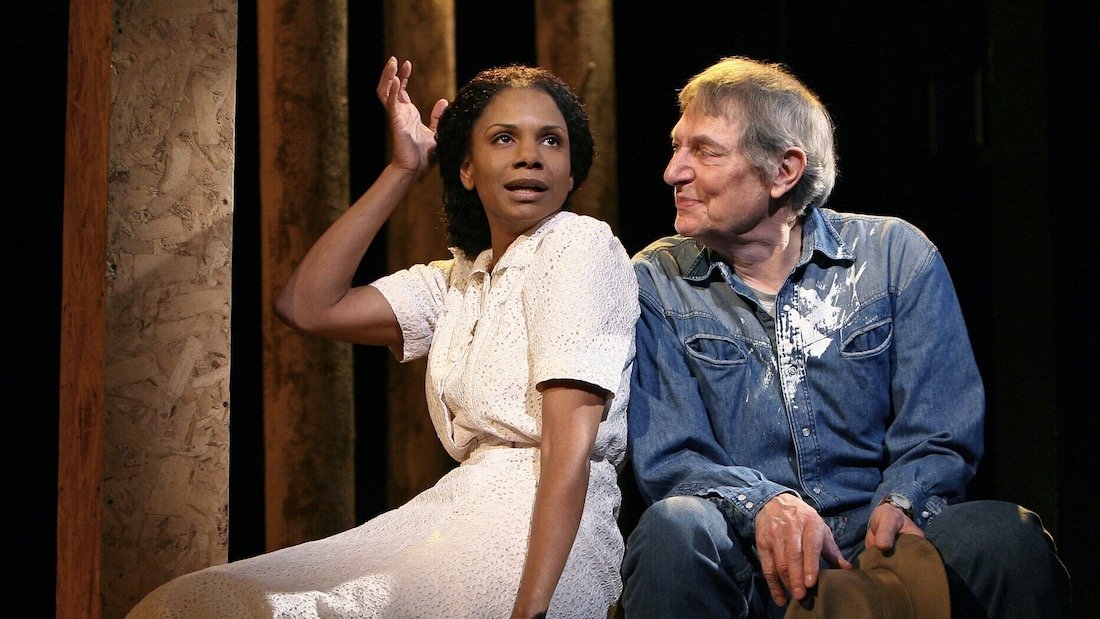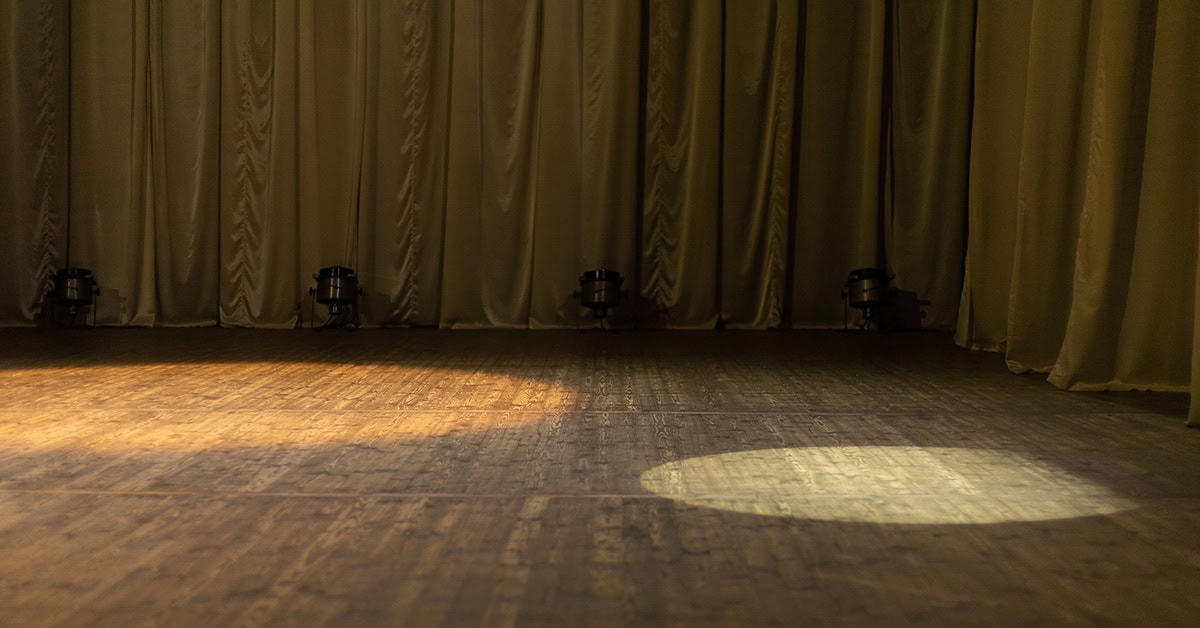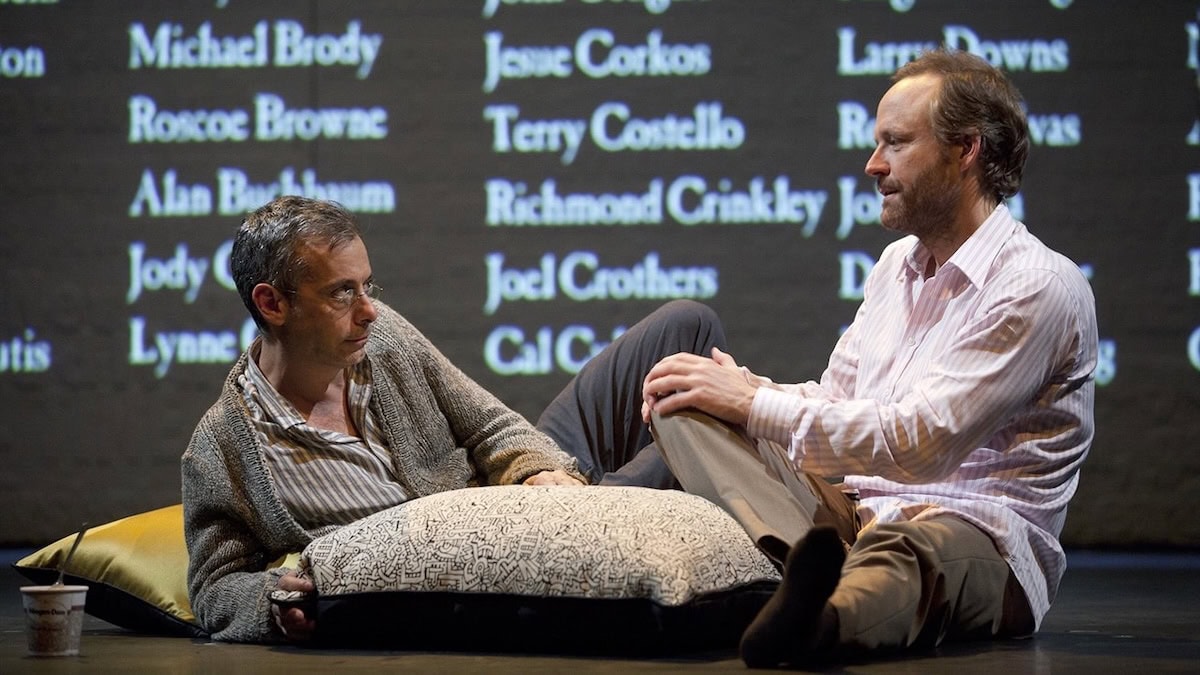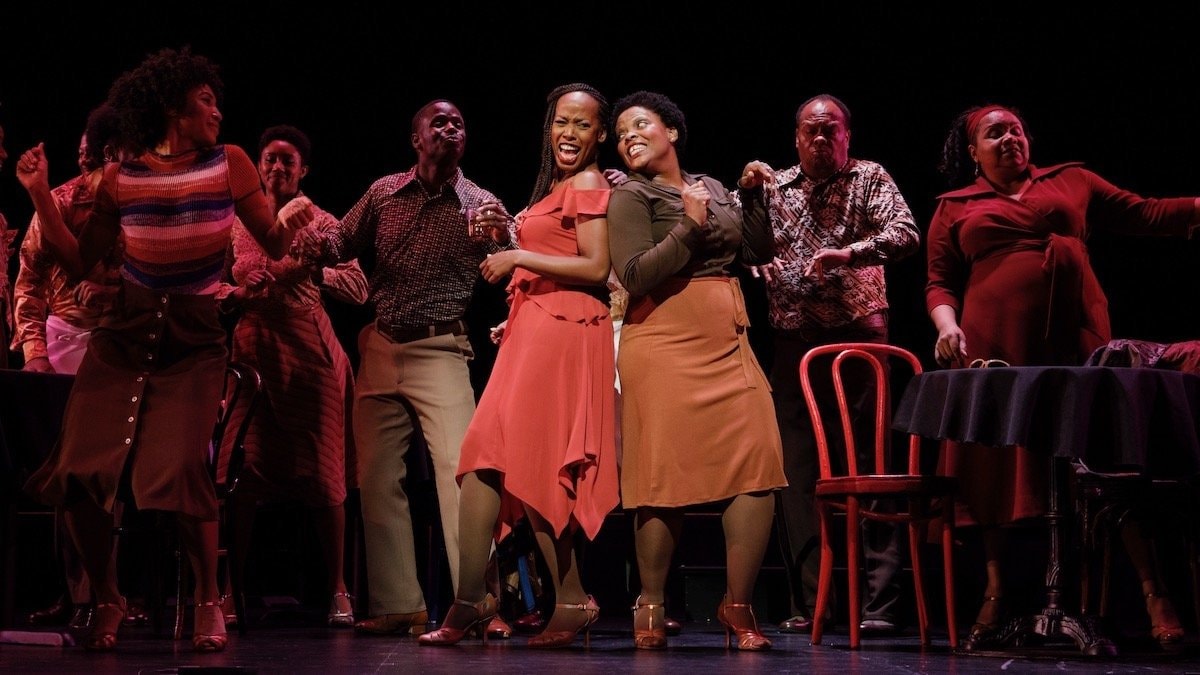
Many of our favorite musicals were adapted from hit plays. Explore this list of Concord Theatricals plays that inspired Concord Theatricals musicals!
1. Ah, Wilderness! and Take Me Along
Ah, Wilderness! (US/UK) by Eugene O’Neill
The play was first presented on Broadway in October of 1933. Notably, this full-length comedy was a sharp departure from the gritty reality of the author’s renowned dramas. Taking place in an idyllic Connecticut town over the course of July 4th weekend of 1906, it offers a tender, retrospective portrait of small-town family values, teenage growing pains, and young love. It was later revived to great acclaim in 1998 at Lincoln Center and received two Tony nominations including Best Revival of a Play!
Take Me Along (US/UK), Music and Lyrics by Bob Merrill / Book by Joseph Stein and Robert Russell / Based on the Play Ah, Wilderness! by Eugene O’Neill / Original Production by David Merrick
The musical premiered on Broadway in October of 1959 — 26 years after Ah, Wilderness! swept The Great White Way. This heartwarming musical adaptation features the songs “Staying Young,” “That’s How It Starts,” “Promise Me A Rose,” and “Take Me Along.” It went on to receive two Tony nominations at the 1960 Tony Awards including Best Musical.
2. Blithe Spirit and High Spirits
Blithe Spirit (US/UK) by Noël Coward
This much-revived classic is a smash-hit comedy of both the West End and Broadway. The play offers up fussy, cantankerous novelist Charles Condomine, re-married but haunted (literally) by the ghost of his late first wife, the clever and insistent Elvira who is called up by a visiting “happy medium,” one Madame Arcati. As the (worldly and un-) personalities clash, Charles’ current wife, Ruth, is accidentally killed, “passes over,” joins Elvira, and the two “blithe spirits” haunt the hapless Charles into perpetuity.
High Spirits (US/UK) Music, Lyrics and Book by Hugh Martin and Timothy Gray
In 1964, the bombastic musical adaptation came to haunt Broadway. The delightful score from Hugh Martin and Timothy Gray includes “Home Sweet Heaven,” “Faster Than Sound,” and “Go Into Your Trance.” It went on to receive eight Tony Award nominations including Best Musical and Best Composer/Lyricist!
3. Green Grow the Lilacs and Oklahoma!
Green Grow the Lilacs (US/UK) by Lynn Riggs
When this play first premiered in 1931, Riggs could hardly imagine that his drama charting the romance between a headstrong farm-girl and a cocky cowhand would go on to inspire the first modern musical. It premiered at the Guild Theatre, directed by Herbert J. Biberman and starring Franchot Tone as Curly McClain, June Walker as Laurey Williams, Helen Westley as Aunt Eller and Lee Strasberg as the Peddler.
Oklahoma! (US/UK) Music by Richard Rodgers, Book and Lyrics by Oscar Hammerstein II
Only a decade later, Oklahoma! — the first partnership between Rodgers and Hammerstein — opened at the St. James Theatre. Rodgers and Hammerstein’s first collaboration remains, in many ways, their most innovative, setting the standards and rules of modern musical theatre. In a Western territory just after the turn of the 20th century, a high-spirited rivalry between local farmers and cowboys provides a colorful background for Curly, a charming cowboy, and Laurey, a feisty farm girl, to play out their love story. Their romantic journey, as bumpy as a surrey ride down a country road, contrasts with the comic exploits of brazen Ado Annie and hapless Will Parker in a musical adventure embracing hope, determination and the promise of a new land. At that time, the longest-running show in Broadway history had run for three years. Oklahoma! surpassed that record by two more years, running for a marathon 2,212 performances. It received a special Pulitzer Prize in 1944 and two Academy Awards for the film adaptation in 1956.
4. I Am A Camera and Cabaret
The story of Cabaret has gone through several iterations, but it all comes back to The Berlin Stories by Christopher Isherwood. From this collection came its first stage adaptation:
I Am A Camera (US/UK) by John Van Druten
In the words of the Herald-Tribune, the play “looks at life in a tawdry Berlin rooming house of 1930 with a stringently photographic eye. For the most part, it concerns itself with the mercurial and irresponsible moods of a girl called Sally Bowles.… As we get to know her, as we watch her make frightened arrangements for an illegal operation, seize at the tinseled escape offered by a rich and worthless American playboy, attempt to rehabilitate herself and fail ludicrously, we are more and more moved, more and more caught up in the complete and almost unbearable reality of this girl. [The author has] placed a character named Mr. Isherwood on the stage… He serves both as narrator and as principal confidant to Sally Bowles. He is the camera eye of the title, attracted to Sally, yet dispassionate about her.” It premiered in 1951 and went on to receive the New York Drama Critics’ Circle for Best American Play.
Cabaret (US/UK) Book by Joe Masteroff, Music by John Kander, Lyrics by Fred Ebb
Fifteen years later, Cabaret swept Broadway with its iconic score by John Kander, lyrics by Fred Ebb, book by Joe Masteroff, and directed by Hal Prince. In a Berlin nightclub, as the 1920’s draw to a close, a garish Master of Ceremonies welcomes the audience and assures them they will forget all their troubles at the Cabaret. With the Emcee’s bawdy songs as wry commentary, Cabaret explores the dark, heady, and tumultuous life of Berlin’s natives and expatriates as Germany slowly yields to the emerging Third Reich. Cliff, a young American writer newly arrived in Berlin, is immediately taken with English singer Sally Bowles. Meanwhile, Fräulein Schneider, proprietor of Cliff and Sally’s boarding house, tentatively begins a romance with Herr Schultz, a mild-mannered fruit seller who happens to be Jewish. Musical numbers include “Willkommen,” “Cabaret,” “Don’t Tell Mama” and “Two Ladies.” The original went on to win eight Tony Awards in 1967 and inspired new versions and updates in 1987 (US/UK) and 1998 (US).
5. Liliom and Carousel
Liliom (US/UK) by Ferenc Molnár.
This 1909 tender drama was first penned by a Hungarian playwright. It follows the title character, Liliom, a shiftless young bully in Budapest. He works intermittently as a barker for a merry go round and many servant girls fall victim to his charms. Among these girls is Julie, whom he eventually marries. Learning that he is about to become a father Liliom participates in a robbery to enhance his fortunes. But he is caught and stabs himself rather than submit to arrest. He is tried in the Magistrate’s court on high, but they see through him there. They know what repentance is in his heart though he is much too cocky to admit it. He is sentenced to a term of years in the purifying fires with the promise that after that sentence has been served, he can go back to earth with a chance to do one good deed there.
Carousel (US/UK) Music by Richard Rodgers, Book and Lyrics by Oscar Hammerstein II
About 40 years later, the Rodgers and Hammerstein adaptation of Liliom, titled Carousel opened at the Majestic Theatre. Moved from Budapest to a coastal village in Maine, we follow the swaggering, carefree carnival barker, Billy Bigelow, who captivates and marries the gentle millworker, Julie Jordan. But Billy loses his job just as he learns that Julie is pregnant and, desperately intent upon providing a decent life for his family, he is coerced into being an accomplice to a robbery. Caught in the act and facing the certainty of prison, he takes his own life and is sent ‘up there.’ Billy is allowed to return to earth for one day fifteen years later, and he encounters the daughter he never knew. How Billy instills in both the child and her mother a sense of hope and dignity is a dramatic testimony to the power of love. This sweeping musical features the hits “If I Loved You,” “What’s the Use of Wond’rin?” and “You’ll Never Walk Alone.”
6. The Madwoman of Chaillot and Dear World
The Madwoman of Chaillot (US) by Jean Giraudoux and adapted by Maurice Valency,
A kind of poetic and comic fable set in the twilight zone of the not-quite-true. At the Cafe Chez Francis, a group of promoters plot to tear up Paris in order to unearth the oil which a prospector believes he has located in the neighborhood. These grandiose plans come to the attention of The Madwoman of Chaillot who is ostensibly not normal in her mind but who is soon shown to be the very essence of practical worldly goodness and common sense. She sees through the crookedness of the prospector and insists that the world is being turned into an unhappy place by the thieves and those who are greedy for worldly goods and power. At a tea party attended by other “mad” women of Paris, she has brought together representatives of the despoilers of the earth and wreckers of its happiness, and has them tried and condemned to extermination. In a scene which mounts into the realms of high poetic comedy, she sends the culprits one by one, lured by the scent of oil and undreamed-of riches, into a bottomless pit which opens out of her cellar. The exodus of the wicked is accompanied by another and more beautiful miracle: Joy, justice and love return to the world again.
Dear World (US/UK</a >), Music and Lyrics by Jerry Herman, Band book by Jerome Lawrence and Robert E. Lee
The original production of Dear World opened on Broadway in 1969 starring Angela Lansbury and Milo O’Shea. A haunting, delicate and charming musical celebrating life, passion and madness. A Tony award winner for its original leading lady Angela Lansbury, the musical features some of Jerry Herman’s most beloved songs, including “Kiss Her Now,” “Each Tomorrow Morning,” “I’ve Never Said I Love You,” “I Don’t Want To Know” and the title song.
7. The Matchmaker and Hello, Dolly!
The Matchmaker (US/UK) by Thornton Wilder
An uproarious farce about love and money stars the irrepressible busybody Dolly Gallagher Levi. Through Dolly’s subtle machinations, several unlikely couples come together to find happiness in 19th-century New York. The Matchmaker opened on Broadway on December 5, 1955 starring Ruth Gordon (Best Actress, Tony Award Nominee), directed by Tyrone Guthrie (Best Director, Tony Award Winner). The Matchmaker ran for 486 performances, Wilder’s Broadway record.
Hello, Dolly! (US/UK) Book by Michael Stewart, Music and Lyrics by Jerry Herman
The musical adaptation of The Matchmaker was taken on by Michael Stewart and Jerry Herman. The exuberant musical produced some of the greatest songs in musical theatre history including “Put On Your Sunday Clothes,” “Ribbons Down My Back,” “Before the Parade Passes By,” “Hello, Dolly!,” “Elegance” and “It Only Takes a Moment.” It opened on Broadway on January 16, 1964 at the St. James Theatre. Opening with Carol Channing in the title role, the show ultimately played for 2,844 performances, making it – at the time – the longest-running Broadway musical in history. In addition, Hello, Dolly! went on to win ten 1964 Tony Awards including Best Musical.
8. The Philadelphia Story and High Society
The Philadelphia Story (US/UK) by Philip Barry
The 1939 Broadway hit originally starred Katharine Hepburn as Tracy Lord of the Philadelphia Lords, a headstrong and spoiled daughter of the privileged. Divorced from C.K. Dexter Haven, she is engaged to a successful young snob. A gossip weekly sends a reporter and a camerawoman to cover the wedding arrangements, and they are injected into the house by Tracy’s brother, who hopes to divert their attention from Father Lord’s romance with a Broadway dancer. Tracy finds herself growing interested in Connor, the fascinating reporter. At the end of a pre-wedding party, Tracy and Connor take a moonlight dip in the pool and meet her ex-husband and fiancé on their way back to the house. The following morning her intended agrees to forgive her, but his smug attitude enrages Tracy and she breaks off the engagement. Connor offers to marry her, but she turns him down and remarries Dexter, to the satisfaction of everyone.
High Society (US/UK) Music and Lyrics by Cole Porter, Book by Arthur Kopit, Additional Lyrics by Susan Birkenhead
In the late 1990’s, writers Arthur Kopit and Susan Birkenhead decided to adapt The Philadelphia Story, and the subsequent film adaptation High Society, and pack it with Cole Porter standards, including “Ridin’ High,” “She’s Got That Thing,” “True Love,” “Just One Of Those Things,” “Let’s Misbehave,” “It’s All Right With Me,” and “Well, Did You Evah?” After its premiere in 1998, High Society went on to receive two Tony Dominations and four Drama Desk Award nominations including Outstanding New Musical.
9. Purlie Victorious and Purlie
Purlie Victorious (US) by Ossie Davis.
The title character, Purlie Victorious, has come back to his shabby cabin to reacquire the local church and ring the freedom bell. An inheritance due to a cousin would supply the needed cash, but unfortunately it is controlled by the plantation colonel. When Purlie sends an imposter to the colonel to claim the inheritance, she is unmasked, and the colonel makes a pass at her. Eventually the church is saved, services are held, and the freedom bell rings.
Purlie (US) Book by Ossie Davis, Phillip Rose and Peter Udell, Music by Gary Geld, Lyrics by Peter Udell
On March 15, 1970, the musical adaptation Purlie made its premiere at the Broadway Theatre. Witty, memorable music and a whole lotta of fun unfold as Purlie outmaneuvers ol’ Colonel and gets his girl Lutiebelle. From the composers of Shenandoah, this musical comedy has continued to delight audiences.
10. The Rainmaker and 110 in the Shade
The Rainmaker (US/UK) by N. Richard Nash
This classic made its premiere at the Cort Theatre in 1954. At the time of a paralyzing drought in the West we discover a girl whose father and t
wo brothers are worried as much about her potential future as an old maid as they are about their dying cattle. For the truth is, she is indeed a plain girl. The brothers try every possible scheme to marry her off, without success. Nor is there any sign of relief from the dry heat, when suddenly, from out of nowhere, appears a picaresque, sweet-talking man with quite the sales pitch. Claiming to be a “rainmaker,” the man promises to bring rain, for $100. It’s a silly idea, but the rainmaker is so refreshing and persistent that the family finally consents, banging on big brass drums to rattle the sky. Meanwhile, the rainmaker also turns his magic on the girl, and persuades her that she has a very real beauty of her own. She believes it, just as her father believes the fellow can actually bring rain. Rain does come, and so does love.
110 in the Shade (US/UK) by N. Richard Nash / Music by Harvey Schmidt / Lyrics by Tom Jones
This subsequent musical adaptation opened on Broadway at the Broadhurst Theatre on October 24, 1963, starring Robert Horton, Inga Swenson and Stephen Douglass. The West End production opened at the Palace Theatre on February 8, 1967, where it played for 101 performances, starring Ivor Emmanuel and Joel Warfield. In 1992, the New York City Opera presented a revival of the show, and a Broadway revival at Studio 54 opened on May 9, 2007, starring Audra McDonald, John Cullum and Steve Kazee. At the time of its original premiere, it was nominated for four 1964 Tony Awards, and the 2007 was nominated for five Tonys, including Best Revival of a Musical!
11. A Raisin in the Sun and Raisin
A Raisin in the Sun (US/UK) by Lorraine Hansberry
One of the most important play in the American theatrical canon, and the first play written by a Black woman to be produced on Broadway, is set on Chicago’s South Side in the 1950’s. The plot revolves around the divergent dreams and conflicts within three generations of the Younger family: son Walter Lee, his wife Ruth, his sister Beneatha, his son Travis, and matriarch Lena. When her deceased husband’s insurance money comes through, Mama Lena dreams of moving to a new home and a better neighborhood in Chicago. Walter Lee, a chauffeur, has other plans: buying a liquor store and being his own man. Beneatha dreams of medical school. The tensions and prejudice they face form this seminal American drama. The Younger family’s heroic struggle to retain dignity in a harsh and changing world is a searing and timeless document of hope and inspiration.
Raisin (US/UK) Book by Robert Nemiroff and Charlotte Zaltzberg / Music by Judd Woldin / Lyrics by Robert Brittan
In 1973, Raisin, opened on Broadway and ran for three years. Lorraine Hansberry’s classic is transformed into a soulful, inspiring musical as a proud Black family’s quest for a better life explodes in song, dance, and incisive human drama. It went on to receive two Tony Awards in 1974 including Best Musical.
12. The Time of the Cuckoo and Do I Hear A Waltz?
The Time of the Cuckoo (US/UK) by Arthur Laurents
The play. follows Leona Samish, a single American woman of a “certain age,” when she takes a long-planned European vacation and finds herself in a pensione in Venice, Italy. At a street market, she meets the handsome proprietor Renato DiRossi, entering into a casual flirtation which turns into an affair. Her complacency is jolted when she discovers he is married, has several children and is quite happy with the arrangement as is. Long-dormant frustrations and anger come to the surface as Leona faces the harsh reality of this new found infatuation and her own romantic notions of love. Shirley Booth and later Katharine Hepburn played the leading role.
Do I Hear a Waltz? (US/UK) Music by Richard Rodgers, Lyrics by Stephen Sondheim, Book by Arthur Laurents
This musical adaptation originally opened on Broadway on March 18, 1965 at the 46th Street Theatre. This bittersweet musical was a rare collaboration between theatrical powerhouses Richard Rodgers, Stephen Sondheim, and Arthur Laurents. It went on to receive three Tony Award nominations including Best Composer and Lyricist — no wonder!
13. Two for the Seesaw and Seesaw
Two for the Seesaw (US/UK) by William Gibson
The long-run Broadway hit that gained stardom for Anne Bancroft in the role of girl from the Bronx whose love for a lonesome lawyer brings a few months of happiness into their lives. The lawyer is married to a beautiful, well-to-do girl in the midwest whose family sets the pace in local society and intends to run his marriage and his career as well. He has rebelled, come to New York, and taken up residence with this intriguing young woman. He is lonely and in need of consolation; she is one of those rare women whose only purpose seems to be making others happy. Their briefly fulfilling relationship is unhappily destined to failure: he is a cultured gentile with a wife and painful memories while she is a plain Jewish girl with little education and thick Bronx accent. They share happy and humorous mome
nts together, but they both see with sadness the utter hopelessness of the affair.
Seesaw (US/UK) Music by Cy Coleman, Lyrics by Dorothy Fields, Book by Michael Bennett
Seesaw first premiered in 1973 at the Uris Theatre. This intimate, engaging love story and a big, brassy musical-comedy rolled into one went on to receive seven Tony Award nominations in 1974 including Best Musical.
14. Vanities and Vanities: The Musical
Vanities (US) by Jack Heifner
This bittersweet comedy is an astute chronicle of the lives of three Texas girls. In 1963, Joanne, Kathy, and Mary are aggressively vivacious cheerleaders. Five years later in their college sorority house, they are confronting their futures with nervous jauntiness. In 1974, they reunite briefly in New York. Their lives have diverged their friendship, which once thrived on assumption as well coordinated as sweater sets, is strained and ambiguous. Old time banter rings false. Their attempts at honest conversation only show they can no longer afford to have very much in common.
Vanities: The Musical (US/UK) Book by Jack Heifner, Music and Lyrics by David Kirshenbaum
This direct adaptation premiered off-Broadway at Second Stage Theater under Artistic Director Carole Rothman and in association with Junkyard Dog Productions Inc on July 16, 2009 in New York City. It was directed by Judith Ivey. This life-affirming musical adaptation featured music and lyrics by David Kirshenbaum and a book by the original playwright, Jack Heifner!
…
To explore even more plays and musicals (whether adapted or not) head to our website in the US or UK.
Photo: 2007 Broadway Revival of 110 in the Shade (Joan Marcus)

Recommended Shows for Drama Festivals

The Truth Behind… The Normal Heart

